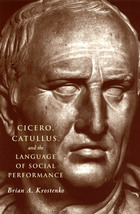
As Krostenko demonstrates, a key feature of this language is its capacity to express both approval and disdain—an artifact of its origins at a time when the "style" and "charm" of imported Greek cultural practices were greeted with both enthusiasm and hostility. Cicero played on that ambiguity, for example, by chastising lepidus ("fine") boys in the "Second Oration against Catiline" as degenerates, then arguing in his De Oratore that the successful speaker must have a certain charming lepos ("wit"). Catullus, in turn, exploited and inverted the political subtexts of this language for innovative poetic and erotic idioms.
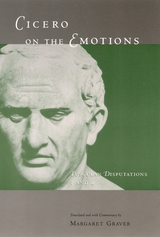
Margaret Graver's elegant and idiomatic translation makes Cicero's work accessible not just to classicists but to anyone interested in ancient philosophy and psychotherapy or in the philosophy of emotion. The accompanying commentary explains the philosophical concepts discussed in the text and supplies many helpful parallels from Greek sources.

The most important literary dispute of the Renaissance pitted those writers of Neo-Latin who favored imitation of Cicero alone, as the single best exemplar of Latin prose, against those who preferred to follow an eclectic array of literary models. This Ciceronian controversy is the subject of the texts collected for the first time in this volume: exchanges of letters between Angelo Poliziano and Paolo Cortesi; between Gianfrancesco Pico della Mirandola and Pietro Bembo; and between Giovambattista Giraldi Cinzio and his mentor Celio Calcagnini. A postscript by Lilio Gregorio Giraldi and writings by Antonio Possevino comment further on this correspondence.
Because they address some of the most fundamental aspects of literary production, these quarrels shed light on similar debates about vernacular literature, which also turned on imitation and the role of the author. The Ciceronian controversy can also be seen as part of larger cultural movements, such as the choice of vernacular language over Latin, the development of Jesuit pedagogy, and the religious conflicts that characterized much of the Renaissance.
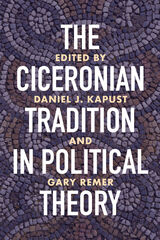
Individual chapters examine the ways thinkers throughout history, specifically Augustine, John of Salisbury, Thomas More, Machiavelli, Montaigne, Hobbes, Locke, Adam Smith, and Edmund Burke, have engaged with and been influenced by Cicero. A final chapter surveys the impact of Cicero’s ideas on political thought in the second half of the twentieth century. By tracing the long reception of these ideas, the collection demonstrates not only Cicero’s importance to both medieval and modern political theorists but also the comprehensive breadth and applicability of his philosophy.
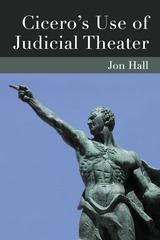
While Cicero’s Use of Judicial Theater will be of interest primarily to professional scholars and students studying the speeches of Cicero, its wider analyses, both of Roman cultural customs and the idiosyncratic practices of the courts, will prove relevant also to social historians, as well as historians of legal procedure.
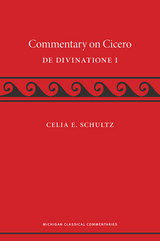
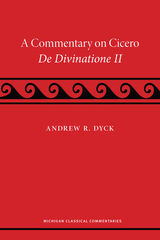
Celia Schultz’s earlier volume in this series presented the text and commentary for De Divinatione I. With Andrew Dyck’s companion volume on the second book of De Divinatione, students and teachers are well served with crucial texts from one of Rome’s most famous philosophers, as he considers important Roman practices and beliefs.
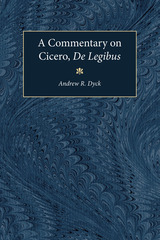
Surprisingly, de Legibus has been one of Cicero's most neglected works. Andrew R. Dyck's commentary is the first to appear on the complete work in well over one hundred years. Dyck provides a detailed interpretation and sets the essay into the context of the politics and philosophical thought of its time. While previous commentaries focused primarily on grammar and textual criticism, this one also seeks to relate Cicero's text to the political, philosophical, and religious trends of his day. The author identifies the influences on Cicero's thinking and analyzes the relation of this theoretical treatise to his other works. This commentary is based on a new text, worked out in consultations between the author and Jonathan Powell of Royal Holloway, London.
Andrew Dyck is Professor of Classics, University of California at Los Angeles.
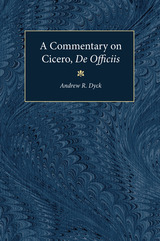
Composed in haste shortly before Cicero's death, de Officiis has exercised enormous influence over the centuries. It is all the more surprising that Andrew R. Dyck's volume is the first detailed English commentary on the work written in this century. It deals with the problems of the Latin text (taking account of Michael Winterbottom's new edition), it delineates the work's structure and sometimes elusive train of thought, clarifies the underlying Greek and Latin concepts, and provides starting points for approaching the philosophical and historical problems that de Officiis raises.
A work of major importance for classicists, philosophers, and ancient historians, this Commentary will be an invaluable companion to all readers of Cicero's last philosophical work.
Andrew R. Dyck is Professor of Classics, University of California, Los Angeles.
Publication of this volume is supported by a grant from the National Endowment for the Humanities.
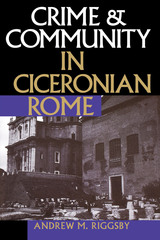
In the late Roman Republic, acts of wrongdoing against individuals were prosecuted in private courts, while the iudicia publica (literally "public courts") tried cases that involved harm to the community as a whole. In this book, Andrew M. Riggsby thoroughly investigates the types of cases heard by the public courts to offer a provocative new understanding of what has been described as "crime" in the Roman Republic and to illuminate the inherently political nature of the Roman public courts.
Through the lens of Cicero's forensic oratory, Riggsby examines the four major public offenses: ambitus (bribery of the electorate), de sicariis et veneficiis (murder), vis (riot), and repetundae (extortion by provincial administrators). He persuasively argues that each of these offenses involves a violation of the proper relations between the state and the people, as interpreted by orators and juries. He concludes that in the late Roman Republic the only crimes were political crimes.
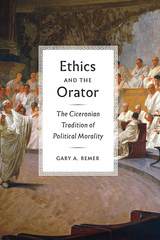
Remer’s study is distinct from other works on political morality in that it turns to Cicero, not Aristotle, as the progenitor of an ethical rhetorical perspective. Contrary to many, if not most, studies of Cicero since the mid-nineteenth century, which have either attacked him as morally indifferent or have only taken his persuasive ends seriously (setting his moral concerns to the side), Ethics and the Orator demonstrates how Cicero presents his ideal orator as exemplary not only in his ability to persuade, but in his capacity as an ethical person. Remer makes a compelling case that Ciceronian values—balancing the moral and the useful, prudential reasoning, and decorum—are not particular only to the philosopher himself, but are distinctive of a broader Ciceronian rhetorical tradition that runs through the history of Western political thought post-Cicero, including the writings of Quintilian, John of Salisbury, Justus Lipsius, Edmund Burke, the authors of The Federalist, and John Stuart Mill.
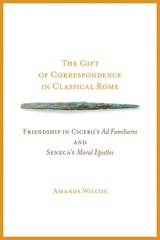
Amanda Wilcox offers an innovative approach to two major collections of Roman letters—Cicero’s Ad Familiares and Seneca’s Moral Epistles—informed by modern cross-cultural theories of gift-giving.
By viewing letters and the practice of correspondence as a species of gift exchange, Wilcox provides a nuanced analysis of neglected and misunderstood aspects of Roman epistolary rhetoric and the social dynamics of friendship in Cicero’s correspondence. Turning to Seneca, she shows that he both inherited and reacted against Cicero’s euphemistic rhetoric and social practices, and she analyzes how Seneca transformed the rhetoric of his own letters from an instrument of social negotiation into an idiom for ethical philosophy and self-reflection. Though Cicero and Seneca are often viewed as a study in contrasts, Wilcox extensively compares their letters, underscoring Cicero’s significant influence on Seneca as a prose stylist, philosopher, and public figure.

The private correspondence of Rome’s most prolific public figure.
To his dear friend Atticus, Cicero reveals himself as to no other of his correspondents except perhaps his brother. In Cicero's Letters to Atticus we get an intimate look at his motivations and convictions and his reactions to what is happening in Rome. These letters also provide a vivid picture of a momentous period in Roman history, years marked by the rise of Julius Caesar and the downfall of the Republic.
When the correspondence begins in November 68 BC, the 38-year-old Cicero is a notable figure in Rome: a brilliant lawyer and orator, he has achieved primacy at the Roman bar and a political career that would culminate in the consulship in 63. Over the next twenty-four years—until November 44, a year before he was put to death by the forces of Octavian and Mark Antony—Cicero wrote frequently to his friend and confidant, sharing news and views and discussing affairs of business and state. It is to this corpus of over 400 letters that we owe most of our information about Cicero's literary activity. Here too is a revealing picture of the staunch republican's changing attitude toward Caesar. And taken as a whole the letters provide a first-hand account of social and political life in Rome.
D. R. Shackleton Bailey's authoritative edition and translation of the Letters to Atticus is a revised version of his Cambridge Classical Texts and Commentaries edition, with full explanatory notes.

The private correspondence of Rome’s most prolific public figure.
To his dear friend Atticus, Cicero reveals himself as to no other of his correspondents except perhaps his brother. In Cicero's Letters to Atticus we get an intimate look at his motivations and convictions and his reactions to what is happening in Rome. These letters also provide a vivid picture of a momentous period in Roman history, years marked by the rise of Julius Caesar and the downfall of the Republic.
When the correspondence begins in November 68 BC, the 38-year-old Cicero is a notable figure in Rome: a brilliant lawyer and orator, he has achieved primacy at the Roman bar and a political career that would culminate in the consulship in 63. Over the next twenty-four years—until November 44, a year before he was put to death by the forces of Octavian and Mark Antony—Cicero wrote frequently to his friend and confidant, sharing news and views and discussing affairs of business and state. It is to this corpus of over 400 letters that we owe most of our information about Cicero's literary activity. Here too is a revealing picture of the staunch republican's changing attitude toward Caesar. And taken as a whole the letters provide a first-hand account of social and political life in Rome.
D. R. Shackleton Bailey's authoritative edition and translation of the Letters to Atticus is a revised version of his Cambridge Classical Texts and Commentaries edition, with full explanatory notes.

The private correspondence of Rome’s most prolific public figure.
To his dear friend Atticus, Cicero reveals himself as to no other of his correspondents except perhaps his brother. In Cicero's Letters to Atticus we get an intimate look at his motivations and convictions and his reactions to what is happening in Rome. These letters also provide a vivid picture of a momentous period in Roman history, years marked by the rise of Julius Caesar and the downfall of the Republic.
When the correspondence begins in November 68 BC, the 38-year-old Cicero is a notable figure in Rome: a brilliant lawyer and orator, he has achieved primacy at the Roman bar and a political career that would culminate in the consulship in 63. Over the next twenty-four years—until November 44, a year before he was put to death by the forces of Octavian and Mark Antony—Cicero wrote frequently to his friend and confidant, sharing news and views and discussing affairs of business and state. It is to this corpus of over 400 letters that we owe most of our information about Cicero's literary activity. Here too is a revealing picture of the staunch republican's changing attitude toward Caesar. And taken as a whole the letters provide a first-hand account of social and political life in Rome.
D. R. Shackleton Bailey's authoritative edition and translation of the Letters to Atticus is a revised version of his Cambridge Classical Texts and Commentaries edition, with full explanatory notes.

The private correspondence of Rome’s most prolific public figure.
To his dear friend Atticus, Cicero reveals himself as to no other of his correspondents except perhaps his brother. In Cicero's Letters to Atticus we get an intimate look at his motivations and convictions and his reactions to what is happening in Rome. These letters also provide a vivid picture of a momentous period in Roman history, years marked by the rise of Julius Caesar and the downfall of the Republic.
When the correspondence begins in November 68 BC, the 38-year-old Cicero is a notable figure in Rome: a brilliant lawyer and orator, he has achieved primacy at the Roman bar and a political career that would culminate in the consulship in 63. Over the next twenty-four years—until November 44, a year before he was put to death by the forces of Octavian and Mark Antony—Cicero wrote frequently to his friend and confidant, sharing news and views and discussing affairs of business and state. It is to this corpus of over 400 letters that we owe most of our information about Cicero's literary activity. Here too is a revealing picture of the staunch republican's changing attitude toward Caesar. And taken as a whole the letters provide a first-hand account of social and political life in Rome.
D. R. Shackleton Bailey's authoritative edition and translation of the Letters to Atticus is a revised version of his Cambridge Classical Texts and Commentaries edition, with full explanatory notes.

The private correspondence of Rome’s most prolific public figure.
Cicero (Marcus Tullius, 106–43 BC), Roman lawyer, orator, politician and philosopher, of whom we know more than of any other Roman, lived through the stirring era that saw the rise, dictatorship, and death of Julius Caesar in a tottering republic. In his political speeches especially and in his correspondence we see the excitement, tension and intrigue of politics and the part he played in the turmoil of the time. Of about 106 speeches, delivered before the Roman people or the Senate if they were political, before jurors if judicial, fifty-eight survive (a few of them incompletely). In the fourteenth century Petrarch and other Italian humanists discovered manuscripts containing more than 900 letters of which more than 800 were written by Cicero and nearly 100 by others to him. These afford a revelation of the man all the more striking because most were not written for publication. Six rhetorical works survive and another in fragments. Philosophical works include seven extant major compositions and a number of others; and some lost. There is also poetry, some original, some as translations from the Greek.
The Loeb Classical Library edition of Cicero is in twenty-nine volumes.

The private correspondence of Rome’s most prolific public figure.
Cicero (Marcus Tullius, 106–43 BC), Roman lawyer, orator, politician and philosopher, of whom we know more than of any other Roman, lived through the stirring era that saw the rise, dictatorship, and death of Julius Caesar in a tottering republic. In his political speeches especially and in his correspondence we see the excitement, tension and intrigue of politics and the part he played in the turmoil of the time. Of about 106 speeches, delivered before the Roman people or the Senate if they were political, before jurors if judicial, fifty-eight survive (a few of them incompletely). In the fourteenth century Petrarch and other Italian humanists discovered manuscripts containing more than 900 letters of which more than 800 were written by Cicero and nearly 100 by others to him. These afford a revelation of the man all the more striking because most were not written for publication. Six rhetorical works survive and another in fragments. Philosophical works include seven extant major compositions and a number of others; and some lost. There is also poetry, some original, some as translations from the Greek.
The Loeb Classical Library edition of Cicero is in twenty-nine volumes.

The private correspondence of Rome’s most prolific public figure.
Cicero (Marcus Tullius, 106–43 BC), Roman lawyer, orator, politician and philosopher, of whom we know more than of any other Roman, lived through the stirring era that saw the rise, dictatorship, and death of Julius Caesar in a tottering republic. In his political speeches especially and in his correspondence we see the excitement, tension and intrigue of politics and the part he played in the turmoil of the time. Of about 106 speeches, delivered before the Roman people or the Senate if they were political, before jurors if judicial, fifty-eight survive (a few of them incompletely). In the fourteenth century Petrarch and other Italian humanists discovered manuscripts containing more than 900 letters of which more than 800 were written by Cicero and nearly 100 by others to him. These afford a revelation of the man all the more striking because most were not written for publication. Six rhetorical works survive and another in fragments. Philosophical works include seven extant major compositions and a number of others; and some lost. There is also poetry, some original, some as translations from the Greek.
The Loeb Classical Library edition of Cicero is in twenty-nine volumes.

Private correspondence and dubious disquisitions.
Cicero had an affectionate relationship with his only brother, Quintus, down to the closing years of their lives. The letters from Cicero to him in this collection offer an intimate look at their world. Cicero’s close friendship with the intensely intellectual Brutus was signalized by Cicero’s dedication of his prized Orator to Brutus. The correspondence between the two collected here dates from the spring and summer of 43 BC, and it conveys some of the drama of the period following the assassination of Julius Caesar.
Shackleton Bailey also provides in this volume a new text and translation of two invective speeches purportedly delivered in the Senate: Sallust attacking Cicero and Cicero attacking Sallust. These are probably anonymous ancient schoolbook exercises, but have come down to us with the works of Sallust and Cicero. Another work in the same category, the Letter to Octavian ostensibly by Cicero but probably dating from the third or fourth century AD, is included as well. Here too (with text by Shackleton Bailey and revised introduction and translation by M. I. Henderson) is the Handbook of Electioneering, a guide said to be written by Quintus to his brother, advising him on campaigning for the consulship of 63 BC. Whether or not this is genuinely the work of Quintus, it remains an interesting treatise on Roman elections. Letter fragments complete the volume; these were not previously available in the Loeb Classical Library.
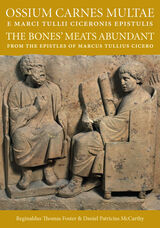

Invectives against Antony.
Cicero (Marcus Tullius, 106–43 BC), Roman advocate, orator, politician, poet, and philosopher, about whom we know more than we do of any other Roman, lived through the stirring era that saw the rise, dictatorship, and death of Julius Caesar in a tottering republic. In Cicero’s political speeches and in his correspondence we see the excitement, tension, and intrigue of politics and the part he played in the turmoil of the time. Of about 106 speeches, 58 survive (a few incompletely), 29 of which are addressed to the Roman people or Senate, the rest to jurors. In the fourteenth century Petrarch and other Italian humanists discovered manuscripts containing more than 900 letters, of which more than 800 were written by Cicero, and nearly 100 by others to him. This correspondence affords a revelation of the man, all the more striking because most of the letters were not intended for publication. Six works on rhetorical subjects survive intact and another in fragments. Seven major philosophical works are extant in part or in whole, and there are a number of shorter compositions either preserved or known by title or fragments.
The Loeb Classical Library edition of Cicero is in twenty-nine volumes.

Invectives against Antony.
Cicero (Marcus Tullius, 106–43 BC), Roman advocate, orator, politician, poet, and philosopher, about whom we know more than we do of any other Roman, lived through the stirring era that saw the rise, dictatorship, and death of Julius Caesar in a tottering republic. In Cicero’s political speeches and in his correspondence we see the excitement, tension, and intrigue of politics and the part he played in the turmoil of the time. Of about 106 speeches, 58 survive (a few incompletely), 29 of which are addressed to the Roman people or Senate, the rest to jurors. In the fourteenth century Petrarch and other Italian humanists discovered manuscripts containing more than 900 letters, of which more than 800 were written by Cicero, and nearly 100 by others to him. This correspondence affords a revelation of the man, all the more striking because most of the letters were not intended for publication. Six works on rhetorical subjects survive intact and another in fragments. Seven major philosophical works are extant in part or in whole, and there are a number of shorter compositions either preserved or known by title or fragments.
The Loeb Classical Library edition of Cicero is in twenty-nine volumes.

READERS
Browse our collection.
PUBLISHERS
See BiblioVault's publisher services.
STUDENT SERVICES
Files for college accessibility offices.
UChicago Accessibility Resources
home | accessibility | search | about | contact us
BiblioVault ® 2001 - 2024
The University of Chicago Press









